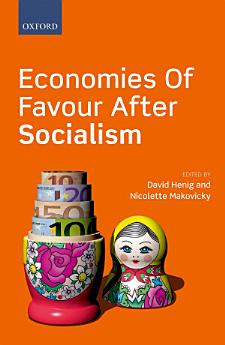Economies of Favour after Socialism
David Henig · Nicolette Makovicky
Dis 2016 · Oxford University Press
E-book
280
Mga Page
family_home
Kwalipikado
info
reportHindi na-verify ang mga rating at review Matuto Pa
Tungkol sa ebook na ito
Since the onset of the global economic crisis, activists, policy makers, and social scientists have been searching for alternative paradigms through which to re-imagine contemporary modes of thinking and writing about economic orders. These attempts have led to their re-engagement with fundamental anthropological categories of economic analysis, such as barter, debt, and the gift. Focusing on favours, and the paradoxes of action, meaning, and significance they engender, this volume advocates for their addition to this list of economic universals. It presents a critical re-interrogation of the conceptual relationships between gratuitous and instrumental behaviour, and raises novel questions about the intersection of economic actions with the ethical and expressive aspects of human life. Scholars of post-socialist politics and society have often used 'favour' as a by-word for corruption and clientelism. The contributors to this volume treat favours, and the doing of favours, as a distinct mode of acting, rather than as a form of 'masked' economic exchange or simply an expression of goodwill. Casting their comparative net from post-socialist Central, Eastern, and South Eastern Europe; to the former Soviet Union, Mongolia, and post-Maoist China, the contributors to this volume show how gratuitous behaviour shapes a plethora of different actions, practices, and judgements across religious and political life, imaginative practices, and local moral economies. They show that favours do not operate 'outside' or 'beyond' the economic sphere. Rather, they constitute a distinct mode of action which has economic consequences, without being fully explicable in terms of transactional cost-benefit analyses.
Tungkol sa may-akda
Nicolette Makovicky is Lecturer of Russian and East European Studies at the University of Oxford. She is the editor of Neoliberalism, Personhood, Postsocialism: Enterprising Selves in Changing Economies (Ashgate, 2014) and has published extensively on informal economic activity in Central Europe. David Henig is Lecturer in Social Anthropology at the School of Anthropology and Conservation, University of Kent. His research, conducted mainly in the Balkans and Central Asia, focuses largely on vernacular Islam, sacred landscape, exchange theory, and more recently on linking anthropology with global transnational history, diplomacy, international relations, and geopolitics. He has authored numerous publications on Islam, dervish orders, Muslim politics, and post-socialism.
I-rate ang e-book na ito
Ipalaam sa amin ang iyong opinyon.
Impormasyon sa pagbabasa
Mga smartphone at tablet
I-install ang Google Play Books app para sa Android at iPad/iPhone. Awtomatiko itong nagsi-sync sa account mo at nagbibigay-daan sa iyong magbasa online o offline nasaan ka man.
Mga laptop at computer
Maaari kang makinig sa mga audiobook na binili sa Google Play gamit ang web browser ng iyong computer.
Mga eReader at iba pang mga device
Para magbasa tungkol sa mga e-ink device gaya ng mga Kobo eReader, kakailanganin mong mag-download ng file at ilipat ito sa iyong device. Sundin ang mga detalyadong tagubilin sa Help Center para mailipat ang mga file sa mga sinusuportahang eReader.






